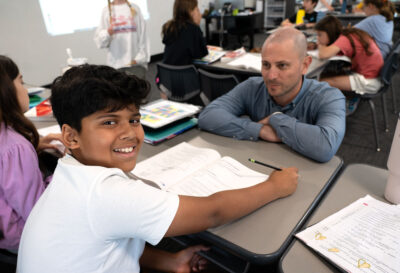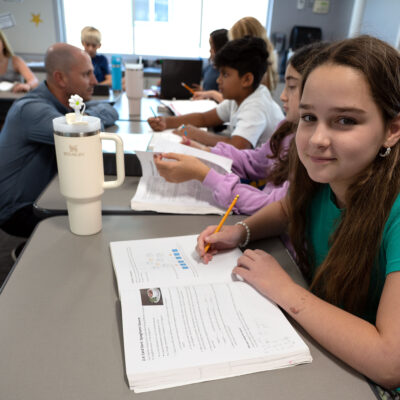How has math changed at Oakwood over the last couple of years?
The elementary school started a new math curriculum last year called Illustrative Math, which is problem-based. It’s a great curriculum and one that I believe in fully, as does the administration. The idea is that kids are able to explore concepts, make meaning for themselves, and eventually figure out the algorithm on their own. This is as opposed to learning by memorization. This allows kids to construct their own understanding and hopefully retain that information longer because they weren’t just told what to do or how to solve a problem. The focus is more on the process than the answer.
How would you define the term “growth mindset” and how do you think it applies to math at Oakwood?
A growth mindset is believing that one’s talents and abilities can be developed through hard work and learning, while a fixed mindset is believing that one’s talents are innate and unchangeable. A fixed mindset is believing that you’re either a math person or not a math person and a growth mindset is the idea that anyone can be successful at math—that’s something that I believe in 100%. Having a growth mindset is knowing that anyone can become really good at math. It just takes resilience, grit, and perseverance.
Tell us more about the math culture at Oakwood…
In my short time here, it’s clear to me that math isn’t about memorization. The focus is on learning, making meaning, and communicating those ideas verbally or in written form. Students are used to being told to show their work and explain their thinking. By doing this, we deemphasize the importance of the answers. The priority in an Oakwood math classroom is deep understanding.
How are you best supporting students this year?
One of the roles that I wanted to take on this year was to be directly involved with students. Some of these students need support for various reasons. Others are looking for ways to expand their already strong math background. Though teachers work hard to engage all of their students, I believe that with my background, I can help positively impact all types of learners.
How do students draw on what they learned in previous years?
The program certainly builds on itself, but there’s also an understanding of certain skills: self-advocacy, communicating different strategies, the focus not being on the answer, but more on the process. That’s something that’s seen consistently throughout the grades.



